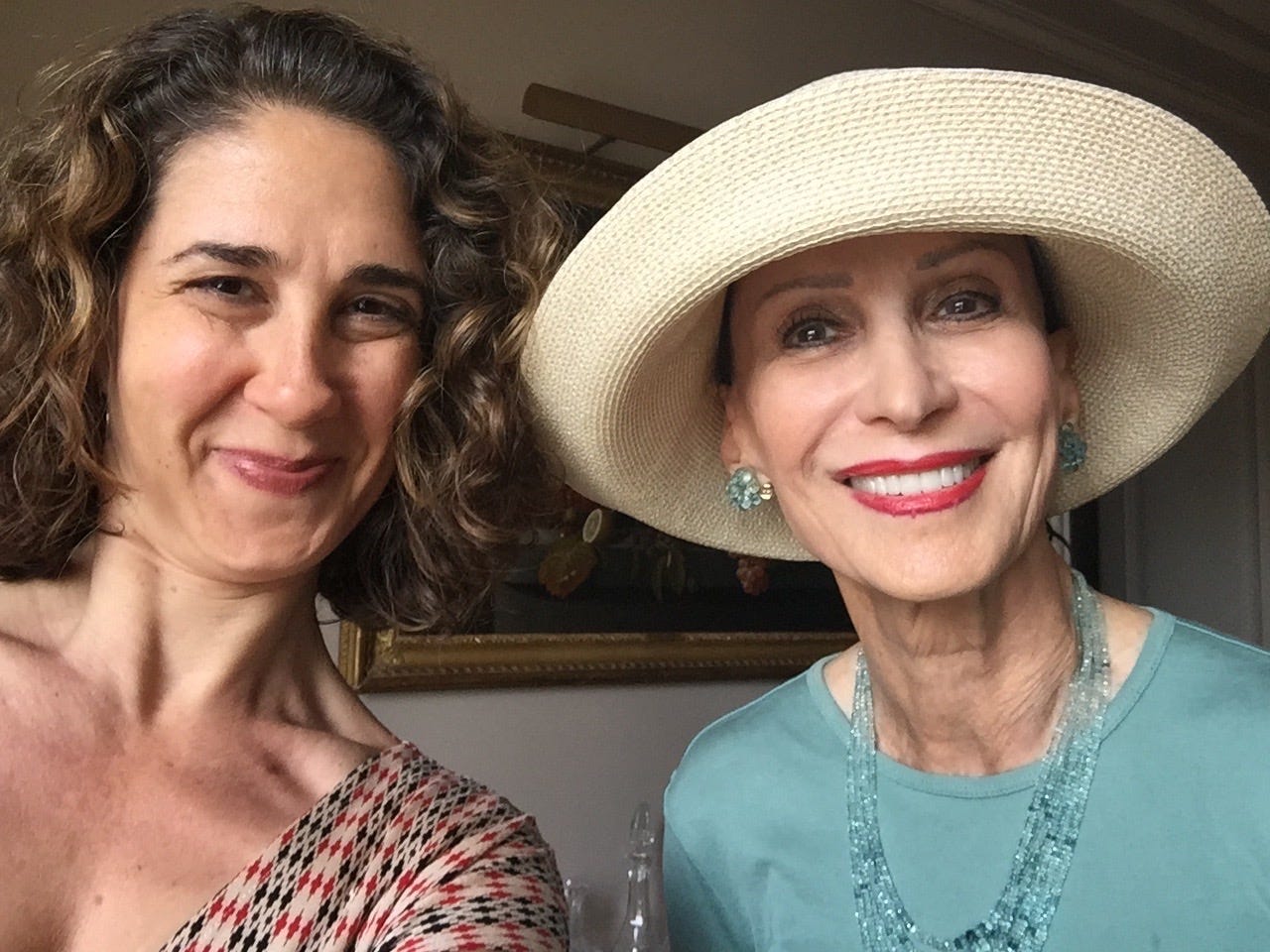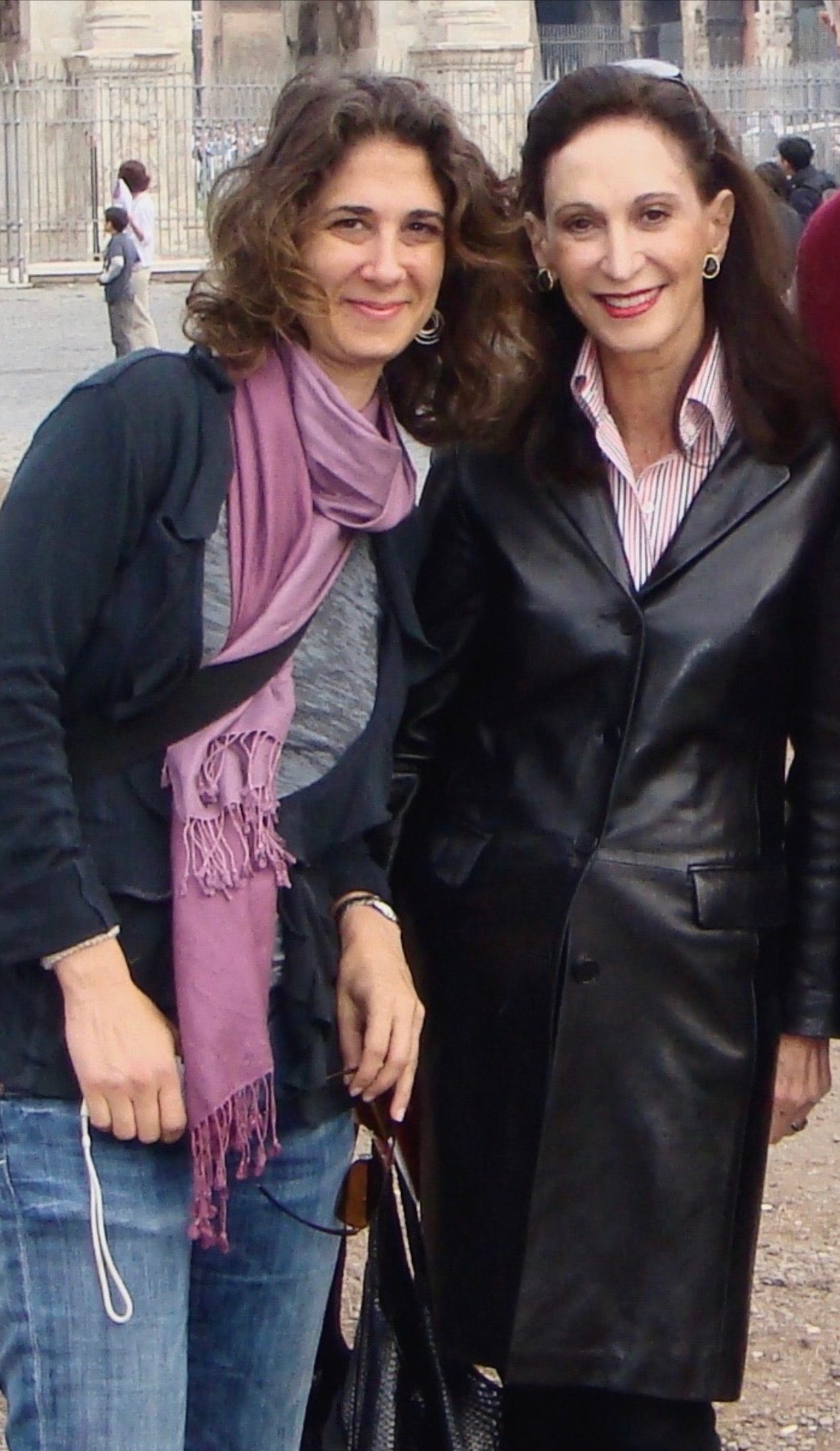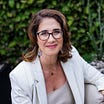When Your Mother Looks Younger Than You
At 52, Blair Glaser makes peace with her mother's apparent agelessness, and her own alleged "flaws."
“Blair, is that your mother?” a new friend shouted above the party chatter, in between bites of a mini-frank.
As I gazed out at the clusters of family, old friends, and new neighbors that had gathered to celebrate my homeownership—the first adult rite of passage I was able to celebrate as a single, childless woman on the brink of 40—my eyes landed on my mother making a signature move: flirting with a guy I’d just started dating.
“Yup,” I said.
“Is she younger than you?” my friend asked.
My mother’s tall and thin and takes good care of herself. She’s young at heart…And yes, she’s also had work done.
We laughed. My stubbornly attractive mother, with her sparkling brown eyes and red-lacquered smile, gestured enthusiastically. Judging from his nodding head and bursts of laughter, my date was charmed.
My mother’s tall and thin and takes good care of herself. She’s young at heart: in normal times, she and my father go out on the town more nights a week than I do in a month. And yes, she’s also had work done. She doesn’t look like a caricature; her face isn’t frozen into a state of surprise. She makes fancy facials, smoothing injections, and plastic surgery look like a no-brainer solution to the heartbreak of decay.
Now, more than a decade after that party, I watch my half-century old chin blend into my neck and my forehead erupt into crinkles a few times a day on Zoom. I feel wizened by the stress of the pandemic, and I’m confronted with the possibility that my mother really does look younger than me. The joke isn’t as funny. How much do I — should I — care? I’ve mostly come to accept that I’m an earth-mother type who’s usually at least partially covered in dog hair. And yet, a sense of competition looms — competition to keep “up” — if not with my mother, then with youth culture itself.
One day when I was 14, I caught a glimpse of myself in the library window and was mortified. My nose seemed to take up my entire face. I went home despondent and complained to my mother…“Don’t worry, we’ll fix it,” she said decisively.
When I was a teenager I was consumed by caring about being “pretty.” One day when I was 14, I caught a glimpse of myself in the library window and was mortified. My nose seemed to take up my entire face. I went home despondent and complained to my mother.
“Don’t worry, we’ll fix it,” she said decisively.
I felt better. That was how it was going to be: fixed. I felt my large nose made me ugly. My mother felt the same way when she was that age, and I imagine she had a similar conversation with her mother back in 1950s Brooklyn. It was what you did. In the post-World War II haze, our noses were a dead give-away of our Jewish ethnicity, and the community of immigrants my grandparents lived in strove for assimilation, to blend in with the dominant culture.
It never crossed my mind that opting to put yourself under anesthesia and a surgeon’s knife is something that deserves serious contemplation, but at dinner the night before the procedure, my mother asked my father, who’d been mum about the whole thing, “What do you think about Blair’s surgery?”
He lifted his wine glass, and considered my face. “I like Blair’s nose as it is. I think it gives her character.”
Now, I watch my half-century old chin blend into my neck and my forehead erupt into crinkles a few times a day on Zoom. I feel wizened by the stress of the pandemic, and I’m confronted with the possibility that my mother really does look younger than me.
As it is. I hadn’t imagined I could be appreciated for how I looked, just as I was. And character? What was that worth? The next day I felt conflicted as I went under anesthesia and rose above my body and watched them go crack! with a mallet and reset my nose to how it looked before adulthood started snooping around. The recovery was dreadful, but when it was all set and healed, the fixed nose did give me a newfound confidence. I forgot about feeling conflicted about the surgery, but I did notice that once my fears about my unattractive nose were resolved, I spent a lot of time thinking about my gigantic thighs.
I probably would have continued on with a life of “fixing it,” following my mother’s lead into a variety of procedures to hoodwink the aging process. Instead, shortly after the nose job, I met a woman named Kate, and that trajectory was thrown for a loop. Kate started off as my acting coach and became my therapist, and if that seems weird, well, it was the 80s and the New Age movement was exploding with mind-body therapies that had all sorts of applications. Kate resembled Sally Field in appearance and feistiness, if you ever saw Norma Rae. She was an adult like no other I’d ever encountered. Her penetrating dark eyes expressed genuine curiosity about my inner experience. She made me feel that my thoughts and opinions carried weight. Her earthly presence laid bare my difference from my mother.
Kate helped me see how my mother’s aesthetic preferences and her sometimes contemptuous way of expressing them, e.g. “What happened to your hair?!” was a form of cruelty that had a devastating impact on my self-esteem. I began to fight back.
“All you care about is looks,” I would growl, when my mother reminded me that I didn’t have to finish that brownie. I felt empowered judging her for being shallow. The playing field was leveled: I was on the road to self-actualization, a path that in my mind gave me authority to overlook my mother’s intelligence and artistic talent, because she chose to live a conventional life. We could each reign over a territory of who we thought we were supposed to be as women living in a capitalist, patriarchal system. My rage grew, and tore our fused identities in two.
Kate helped me see how my mother’s aesthetic preferences and her sometimes contemptuous way of expressing them, e.g. “What happened to your hair?!” was a form of cruelty that had a devastating impact on my self-esteem. I began to fight back.
Over the course of many years, my mother and I gradually found our way back to each other. The culmination of our struggles took place on a family trip abroad in 2010. On the way to Italy, I felt something like pride about her youthful countenance when the flight attendant asked, “Sorelle? Sisters?” The attendant was not—as the many men before her—asking as a way of flirting with my mother;, she genuinely wanted to know.
But a few days later, I bit into a bruschetta, and felt my mother watching me.
“You have dark circles under your eyes,” she announced. “You should cover them up with some make-up.”
It felt like a missile attack in the gut, and I left the bruschetta for the bathroom. My mother, with her circle-free eyes, found me staring into the ladies room mirror, my raccoon eyes staring back, with all the humanity—the jet lag, the overindulgence in Tuscan wine and the years of heartache from still being single into my forties—sitting in those shadowy half-moons.
“Are you okay?” she asked.
I felt my mother watching me…“You have dark circles under your eyes,” she announced. “You should cover them up with some make-up.”It felt like a missile attack in the gut…
Part of me wanted to scream and make a scene, or punish her with silence. But we were on a trip and I wanted to get along.
“I know you’re trying to help.” I said. “But when you say things like that, all I can think about are my flaws, and that everyone can see them.”
To her credit, she simply said, “Oh, I’m so sorry. I thought it would help.”
And somehow, after all those years of friction, that moment of apology allowed me to know, and stand in, our different views of being women. I’ve come to accept that the ridiculous and rigid standards of beauty we women hold ourselves to are not my mother’s fault, and entirely her prerogative.
When I was preparing for my first wedding at age 49, my mother generously schlepped with me through the New York City streets, hunting for the right shoes. Waiting at a crosswalk, she gave me the ominous once-over that used to push my buttons.
I can get injections. I can get surgery. And one day I might…For the time being, I’m finding meaning in the struggle to love myself and face as it is.
“If you want, I’ll get you some Botox for the wedding.”
I thought about taking my mother up on her offer—braving the needles and the chemicals to arrive at Botox smooth, how gorgeous the wedding pictures would be, how I would look and maybe feel like a younger bride than I am. My fiancé would reject the idea, but be pleased with the results.
The light changed and the fantasy passed. I rejected her invitation. I can get injections. I can get surgery. And one day I might.
For the time being, I’m finding meaning in the struggle to love myself and face as it is. Plastic surgery and injections might make me feel better, but they can’t change the fact that we are here for a short time, death is inevitable, and everything changes, including the face I rely on so heavily to interact with the world.









The "heartbreak of decay". Centering aging as "decay" is such an utterly painful paradigm. That's what broke my heart about this piece.
Thanks for this story. I think it rings a bell with so many whose mothers are either more beautiful, younger looking, or more talented. Her story is written with such understanding of and affection for herself, and so importantly I think, with obvious love for her mother. Her finding peace with herself in spite of a lifetime of criticism, is a gift to us all. Also, I have to, (inappropriately) comment on Blair Glaser's looks (not unlike her mom)What a beautiful happy face she has!